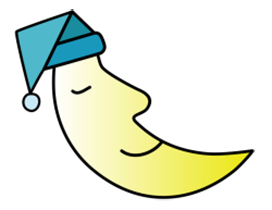How Much Sleep Do I Need?
The simple answer to that question is “that amount of sleep that allows you to be wide awake and alert the whole following day”. The real question is, “How can I find out if I need more or less than 8 hours of sleep?”
First you must establish a constant wake up time 7 days a week for at least 2 weeks. Assuming you do not have a sleep pathology like obstructive sleep apnea, you start with the knowledge that a normal average person needs about 8 hours of quality sleep per night. Why? Because about 40% of our total sleep time is “deep and restorative sleep” meaning 25% of our total sleep time is dream sleep (REM) and 15% of sleep time is slow wave sleep (delta). Simple math tell us that 40% of 8 hours is 3.2 hours of deep sleep. However, there are some rare individual that get 3.2 hours of deep sleep in only 4 hours of total sleep. On the other extreme are some unfortunate people that require 10 hours of total sleep to get the 3.2 hours of deep sleep. Over the years of sleep research, 3.2 hours has been the average number of deep sleep hours an individual needs to stay fully awake during the following day.
With the above facts let’s assume you need closer to 8 hours. To find your ideal sleep time, start with less than 8 hours sleep, i.e: 6 hours. If your normal sleep schedule is between 11p.m.-7a.m., stay awake until 1a.m. and wake up at the normal 7a.m. From there you progressively go to sleep 15 minutes earlier (12:45, 12:30, 12:15) each night until it takes longer than 10 minutes to fall asleep. That sleep time is your ideal duration of sleep. It may be slightly less than 8 hours or more than 8 hours but this is your ideal total sleep time.
In regards to children and adolescents in their second decade i.e.: between 10-20 years of age, it has been found that they require a minimum of 9 hours and 45 minutes. Stated another way if they only sleep 8 hours they are sleep deprived.
I hope this information is helpful to you in your quest for restful and restorative sleep. Should you have any questions about this or another sleep matter please do not hesitate to call us at 636-936-1809.
Richard E. Parcinski,
D.O. ,F.C.C.P. Fellow of American Academy of Sleep Medicine
The Monday Blues – Similar to jet lag?
I have the Monday Blues- why?
Assuming it’s not after super bowl Sunday with too much food and alcohol, and you just stay awake longer and sleep in on the weekends (as many people do), it’s what sleep doctor’s call a “Delayed Phase Syndrome”. It is similar to the feeling of jet lag. Our brains are not on a twenty four hour clock. We are closer to twenty six hours. So what?
If your regular sleep schedule is from eleven PM to seven AM Missouri time, and you travel to California, all you need to do is stay awake two hours longer and sleep in two hours longer to be on par with your usual routine. Very easy.
Now, consider this: This is one AM to nine PM Missouri time, which may be closer to your weekend sleep schedule if you go to a party or just have a different routine on the weekends. Our brains find it easy to go “west” (stay awake on weekends) up to two hours longer, but can only come back “east” (wake up earlier / working Monday through Friday) about fifteen minutes per night. For every two hours we go “west” it would take about eight days to get back “east”. Unfortunately we usually only work five days so we never fully make it back.

In the example above if you sleep in for two hours on Saturday and Sunday morning, it’s like your brain travels to California. Sunday night when you want to fall asleep at eleven PM your brain says to you “for you it’s eleven for me its nine PM good luck”.
The answer is simple never sleep in no matter how late you stay awake. It’s the sleep in time that sends you “west”.
Have a great weekend, be safe, and “Do you best to get your rest!”
A Sleep Quote from Earl Nightengale
“We are at our very best, and we are happiest, when we are fully engaged in work we enjoy on the journey toward the goal we’ve established for ourselves. It gives meaning to our time off and comfort to our sleep. It makes everything else in life so wonderful, so worthwhile.” – Earl Nightengale
Happy Thanksgiving!
One of our favorite posts of the year!
Question for the day: Does the Tryptophan in turkey really make you sleepy—and is the turkey completely to blame?
Answer: Turkey actually contains no more of the amino acid tryptophan than other kinds of poultry. Despite popular belief, turkey doesn’t even have quite as much tryptophan as chicken! But when you think about it, when was the last time someone ate a chicken breast at a summertime barbecue and thought they felt sluggish because of it? When people overeat food, the digestion process takes a lot of energy….so don’t put ALL the blame on that poor turkey! Coming up on the holidays and trying to get all the things done that one would normally be doing, many people short cut their sleep and that can cause an increase in fatigue. That being said, blaming the turkey is more fun when it comes to finding a cause for taking that Thanksgiving nap, and it does help put you to sleep (just not as much as one might think)!
For today’s Yahoo related post, click here: Don’t Blame the Turkey: The Truth Behind Tryptophan
Courtesy of TCSM. You can find us on Facebook, Twitter and at
www.tricountysleepmedicine.com
Bedroom Settings for Quality Sleep
If you have health issues with your overall energy, wakefulness, and sleep in general, have you ever asked yourself “How does where I sleep impact my life?” Perhaps that question may go unnoticed for a long time, until it becomes a real danger to your health and productivity. From a post on the Wisconsin Rapids Tribune website, Dr. Christina Brown makes the following statement:
“A third of the adult population suffers from insomnia from time to time, but only about 6 percent meet the criteria for an actual sleep disorder,” says Dr. Christina Brown from the Florida School of Professional Psychology at Argosy University in Tampa. “In a good number of cases, getting to sleep and staying asleep is a matter of your surroundings.”
-an excerpt from post “The bedroom: the key to a restful night’s sleep” a well written post from www.wisconsinrapidstribune.com describing some simple steps you can take to get more quality sleep.
This indeed should be considered if you have health issues relating to sleep. Click the link above to read the full article and ask yourself, “Are there changes I can make to my bedroom surroundings that could impact my health in a beneficial way?” The suggestions provided might in fact help you in an unexpected and beneficial way.
Have a great day and treat yourself with some designated time to relax.
Dream Quiz
Take the quiz! Can an odor effect the quality of your #dreams? The answer may surprise you. From your ability to store #memories during #sleep to the subject of how #medications influence dreams, this quiz may help answer some of your questions regarding dreams.
WebMD Dream Quiz

